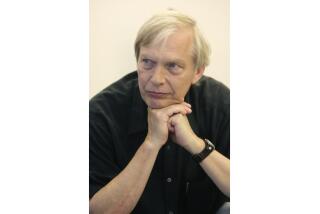Vince Edwards, TV’s Dr. Ben Casey, Dies at 67
- Share via
Vince Edwards, whose portrayal of the brooding, brilliant TV doctor Ben Casey in the 1960s set the standard for many of today’s contingent of handsomely troubled television physicians, has died. He was 67.
Edwards lost a months-long struggle against pancreatic cancer Monday night at UCLA Medical Center, his family said. He had been hospitalized for the last 11 days.
“He was, in life, larger than life,” his wife, Janet Edwards, said. “And he loved being Ben Casey up until the end.”
Although Edwards began his acting career on the New York stage in the late 1940s and toiled in near anonymity through numerous film and television productions in the 1950s, he became an overnight sensation when “Ben Casey” hit the airwaves on ABC in October 1961.
The show shot quickly to the top of the network’s roster, driven by Edwards’ portrayal of a type of physician until then unseen on television: handsome but difficult, strong-headed and softhearted, constantly dueling disease and the medical establishment at once.
“He was the George Clooney of those days,” said his agent, T.J. Castronovo, referring to the heartthrob actor on NBC’s current hit medical drama “ER.”
Edwards frequently graced the covers of teen “fan-zines,” one of them promising “100 Intimate Facts” about the actor. A Washington physician consulted during the last months of Edwards’ life was one of many over the years who confessed to taking the Hippocratic oath thanks to Ben Casey, said film director William Friedkin, a longtime friend.
Born Vincent Edward Zoino in 1928, Edwards was raised in one of the roughest neighborhoods of Brooklyn, N.Y. At 14, he pawned his twin brother Bob’s clothes for spending money and advised his sibling never to borrow $10 from one person; borrow 50 cents from 20 people and “you’ll never have to pay them back,” Janet Edwards said.
After deciding to become an actor--rather than a “con man or wise guy,” as he liked to say, Edwards landed a contract with Paramount Pictures in 1951. By 1955, with several B-type films under his belt, including “Mr. Universe,” he was being quietly compared to Marlon Brando and the then recently deceased James Dean.
But Edwards toiled away on Hollywood’s second tier until a visit to the wrong audition room one day in 1961. Instead of reading for the part of an airline pilot, he ended up reading for the part of a strapping young doctor.
The show, which ran for five years, also starred the late actor Sam Jaffe as Dr. David Zorba, an unflappable neurosurgeon given the task of mentoring the more volatile Casey. It rated in the top 10 during the 1962-63 season, even as NBC produced a rival hit medical drama, “Dr. Kildare,” starring Richard Chamberlain.
After the show was canceled, Edwards made several notable films--including Stanley Kubrick’s low-budget classic “The Killing”--and some forgettable ones. But to his fans, he was always Ben Casey.
As the offers to act became more and more infrequent, Edwards turned once again to the grittier activities of his youth, family and friends said, becoming a regular at racetracks and card games. He struggled for years with a gambling problem as he continued to do occasional film and television work.
“Vince was a gambler,” Friedkin said. “He would be the first to tell you that he had sacrificed a good portion of his career to an addiction. And he was trying to address that right up until the end.”
Friedkin, who directed Edwards in 1987’s “Deal of the Century” and a movie for cable television, said his friend’s place in television history would be secure, even if his career over the long term did not live up to early predictions.
“It’s no great sin for an actor to be remembered for one role,” Friedkin said. “That role was strong. That role was indelible.”
In addition to his wife and brother, Edwards is survived by three grown daughters. Private services for the actor will be held Friday in Los Angeles.
More to Read
The complete guide to home viewing
Get Screen Gab for everything about the TV shows and streaming movies everyone’s talking about.
You may occasionally receive promotional content from the Los Angeles Times.





